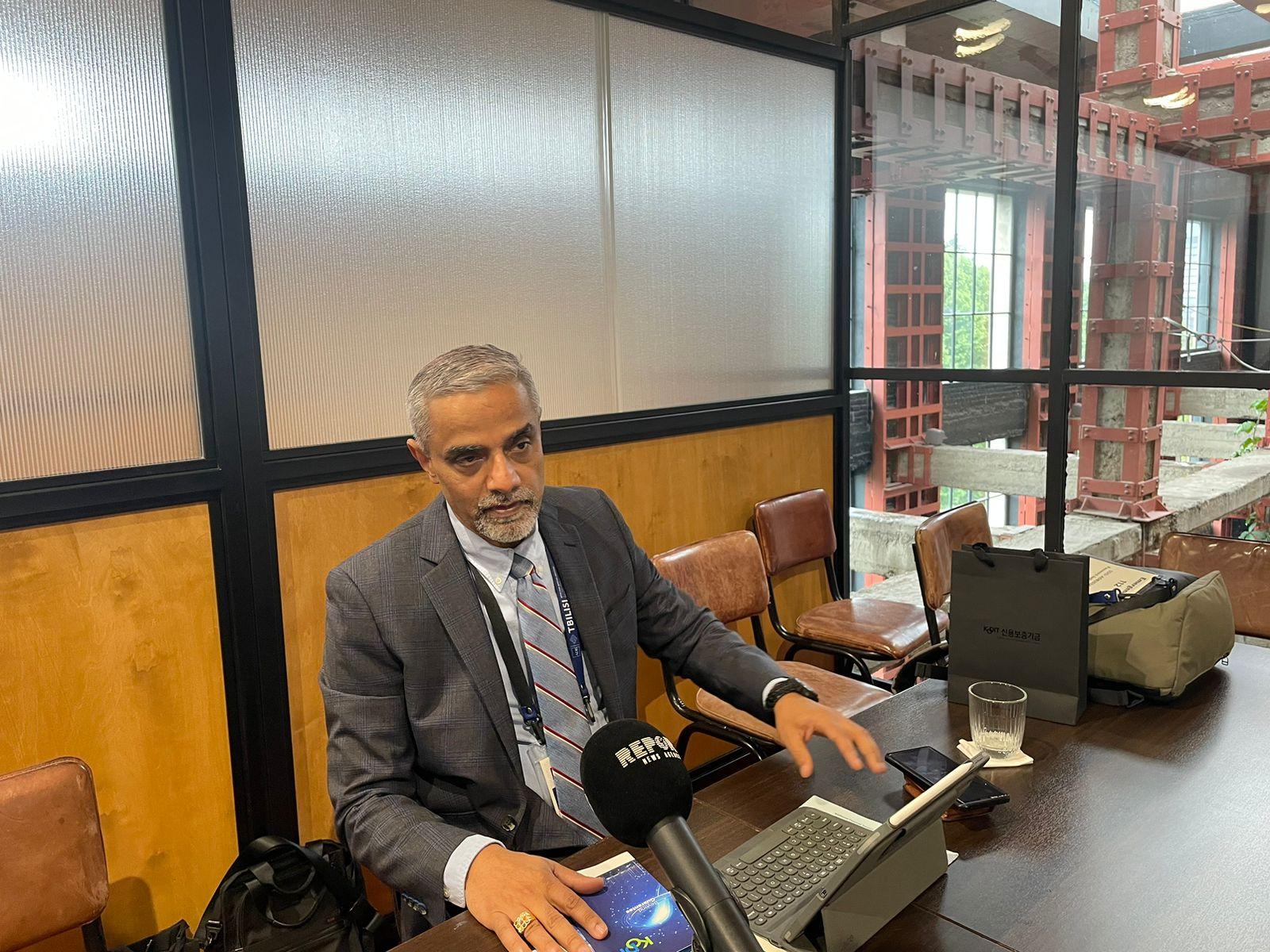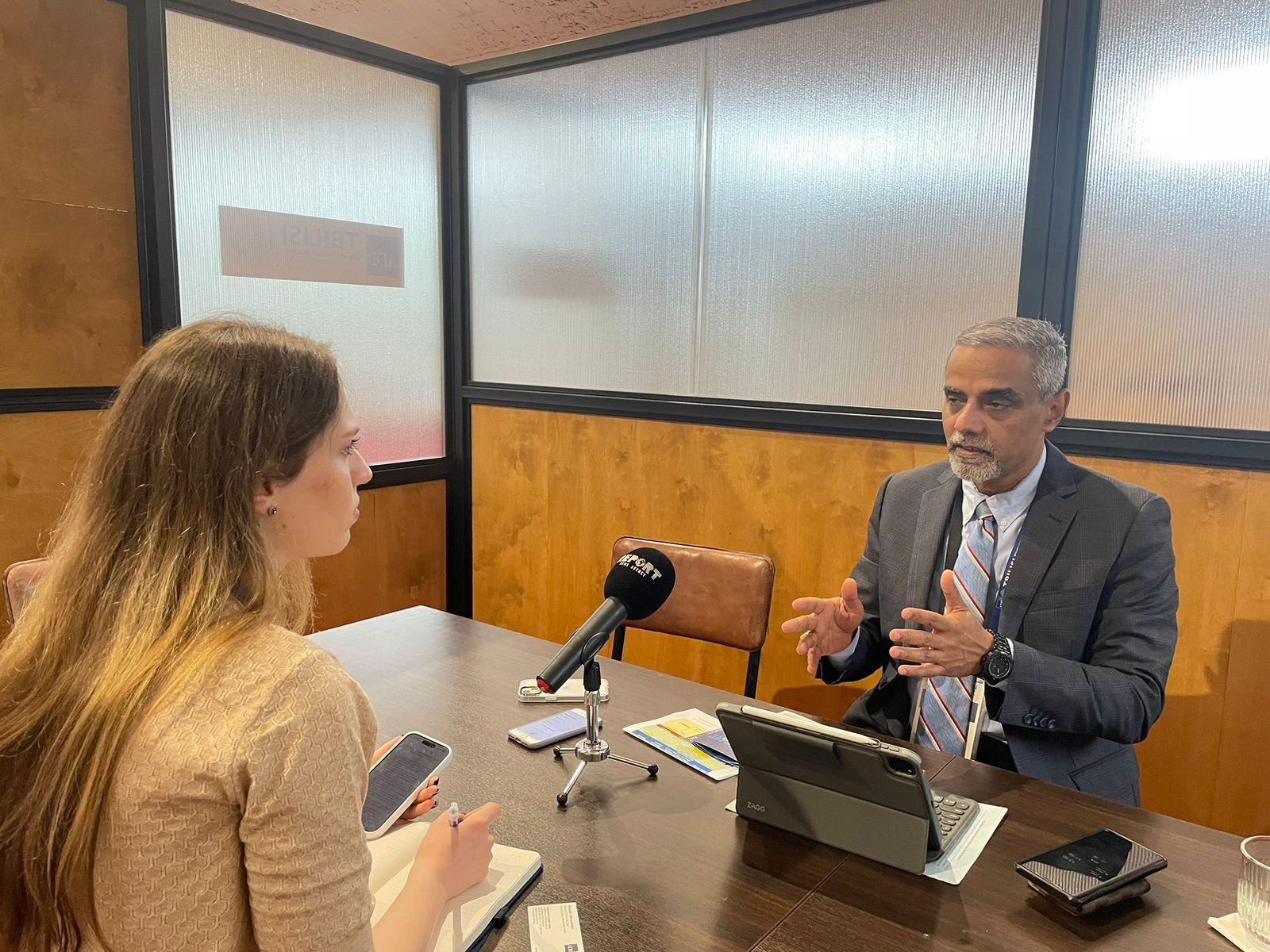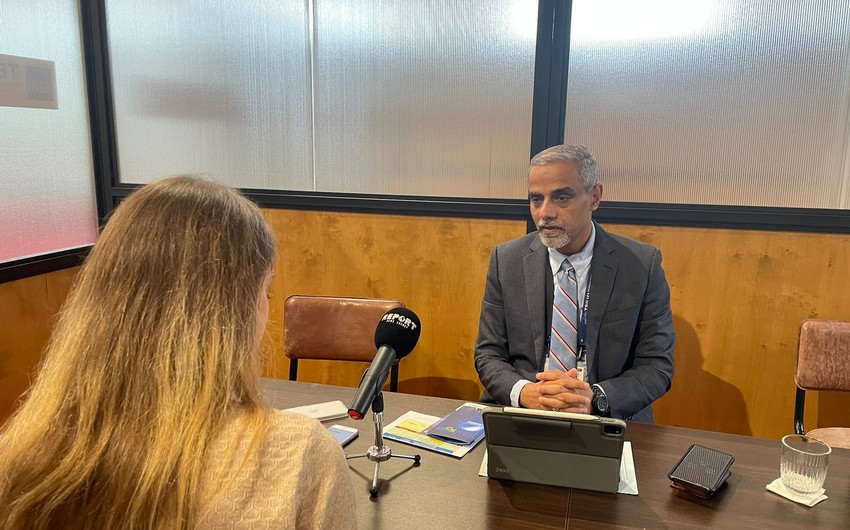Azerbaijan is actively developing the use of renewable energy sources and green energy, recognizing their importance for environmental sustainability and economic development.
Particular attention is paid to cooperation at the regional level, as this facilitates the exchange of advanced technologies and experience, which helps to accelerate the adoption of green energy solutions and create a sustainable energy future for the entire region.
In an interview with Report, Ramesh Subramaniam, Director General and Sectors Group Chief of the Asian Development Bank, shared his thoughts on how Azerbaijan’s energy goals align with ADB’s strategic goals, the unique benefits of integrating hydrogen into energy strategies, and the challenges of transitioning existing infrastructure to use green energy in modern conditions, etc.
- How do you assess the consistent organization of the Conference of the Parties to the UN Framework Convention on Climate Change by the UAE and Azerbaijan, countries rich in fossil fuels? Do you consider this a positive development?
- We definitely think so. I think this is a very clear acknowledgment by the two countries that while they have their own energy resources, not just for themselves but for the rest of the world, they also have a commitment to combating climate change. And this certainly demonstrates the very strong commitment of these countries to combat climate change.
Thus, Azerbaijan will become a place for the formation of a global consensus on change. Countries will also be thinking about how they can look at issues related to their own energy systems, because the UAE also came up with this issue at COP28. And the answer was that oil and other fossil fuels will continue to be important in the near future.
If you look at other energy sources such as coal, in the case of the Asia-Pacific region, it is clear that these resources will be important in the short term, but will not last forever. Countries need to diversify their economies and look for alternative energy sources, not only from the point of view of energy security, but also from the point of view of economic diversification.
So how long can countries depend on a very narrow set of sources of growth? This question worries politicians in many of these countries. If you look at the global overview that was presented at COP28, you will see that many countries have joined the energy transition initiative. For example, by 2030 the number of renewable energy sources will triple, the reduction of coal energy will accelerate, and so on.
Many countries, including Azerbaijan, have signed this agreement. So, I think we [the Asian Development Bank] definitely welcome COP29 to Azerbaijan.

- Could you tell us more about your expectations from COP29?
- Obviously, with any COP there is a set of expectations from the international community, including what the country itself and neighboring states will do. I hope all countries will report on progress towards meeting their commitments, such as different pathways towards net zero.
There may also be specific initiatives. In the case of Southeast Asia, during COP26 we worked with several countries to develop a framework called the Energy Transition Framework. And every year we use the Conference of the Parties to the UN Framework Convention on Climate Change as our reporting platform.
ADB is pleased to have Azerbaijan's chairmanship because it is a member state of the bank that is important in the region, with which we have extensive cooperation, including in the energy sector. And we look forward to continuing cooperation with your country, especially in the area of expanding renewable energy as part of the current global review.
Therefore, I think that if we look at individual initiatives to which we are all committed, we can expect that progress will be achieved on the part of Azerbaijan itself. Obviously, it has its own 2030 commitments, revised or expanded Nationally Determined Contribution (NDCs). Obviously, there are expectations that the country itself will move forward.
- How do you think developing countries can be encouraged to build their economies around green energy to avoid repeating key industrialization mistakes made by previously developed countries?
- I think there is a very clear understanding that in the context of climate change, time is not in our favor. The Asia-Pacific region, as we have always noted, is responsible for more than half of all global greenhouse gas emissions. Many industries in this region, such as construction, cement and steel production, contribute significantly to these emissions.
Even an industry that may have been undervalued before the pandemic has become relevant in light of its aftermath. This fact was highlighted at COP28 when the UAE held its first ever Health Day. A day was set aside to discuss the relationship between climate and health.
It is also noteworthy that during India's G20 Presidency, we helped launch the Climate and Health Initiative.
For example, the global health sector, considered as a nation in its own right, would be the fourth largest greenhouse gas emitter. It is important to note that this sector alone contributes about 5% of total greenhouse gas emissions.
And the global maritime sector, if measured as an individual nation, would be the fifth largest emitter of greenhouse gases.
So, I think change is needed. First, countries are asking for more innovative financing, and the financial sector in transition also needs constant modernization.
I would also like to remind you that the 26th COP launched the Glasgow Financial Alliance for Net Zero.
As ADB, we are working very closely with many countries, especially regional blocs such as ASEAN, for example, in developing their own green taxonomy. Reforms are currently underway at the national level. It is clear that these imperatives require action at both the national and regional levels.
And finally, how can we stimulate developing economies by simply supporting them to develop new technological solutions? The costs of using renewable energy sources are falling. For example, if you look at solar energy, you will see that its energy production costs are falling quite quickly. A couple of years ago we held a large-scale auction in Cambodia. We received the lowest rate ever agreed upon - less than 3.5 cents per kilowatt-hour. So, this is a significant step forward. Solutions such as “green ammonia”, “green hydrogen” are also under development.
The other point is about innovation, and this requires real funding mechanisms. ADB has an energy transition mechanism that provides funds to accelerate the retirement of coal-fired power plants. We provide countries with preferential financing.
We have collaborated with climate investment funds as well as the Global Energy Alliance for People and Planet (GEAPP). Japan, Germany, New Zealand and other countries have provided us with subsidies, which we are using to speed up the retirement of some coal-fired power plants. At COP28 we again signed a Memorandum of Understanding on one of these power plants, which we hope will provide impetus for others to move away from coal.
Various steps are needed to drive the transition, both in technology, policy, legislation, regulation, environment and so on.

- Could you say how Azerbaijan’s energy goals are consistent with the strategic goals of the Asian Development Bank?
- ADB actively cooperates with Azerbaijan, where one of the dominant sectors is energy. We work with countries based on our assessment of their priorities and how they align with ours.
Azerbaijan introduced its first NDC (nationally determined contributions) in 2017. It implied a reduction in greenhouse gas production and emissions by 35% by 2030. The government has subsequently revised its National Action Plan, increasing it to 40% by 2050, and international support and commitment will be available in the form of funding, technology transfer and capacity building.
The government has actually developed some very clear measures to implement and achieve the goals of the NDC. For example, in the energy sector, legislative reforms have been made to increase renewable energy production and energy efficiency of generation. There has indeed been an impulse in Azerbaijan to support the introduction of modern technologies. Thus, efforts have been made to improve existing plans because some of them require large-scale investments, otherwise you will be left with significant assets on the verge of bankruptcy.
We would like to particularly note the efforts of the Azerbaijani government in the adoption of the law of 2021 (ed. “On the efficient use of energy resources and energy efficiency”). This is a kind of landmark legislation. In terms of strategic priorities and goals, Azerbaijan is actually fully aligned with ADB's approaches as well as development priorities.
We discussed this with the government, and recently agreed to provide technical support to Azerbaijan, in particular in the area of optimization and decarbonization of the district heating sector, because heating is a large consumer of energy. We will also help develop legislation and strategy for the development of the national heating sector and provide support in assessing the potential of renewable energy sources, especially using some of these new technologies.
- How do you think cooperation between Azerbaijan and ADB on energy security could impact diversification efforts in the region?
- Azerbaijan is an important economy in the South Caucasus region and in general in Central Asia and countries with economies in transition. The country is seeking to export surplus renewable energy, including to Europe, taking advantage of some of these regional synergies.
In this context, ADB promotes regional cooperation - integration is a key goal of our bank. Therefore, we believe that cooperation with Azerbaijan can contribute to change.
It should be emphasized that not all neighboring countries can host the Climate Change Conference of the Parties. So, when regional leaders come and watch their neighbor host an important global meeting like COP and make commitments, it also raises public awareness around the world.
We believe that the commitments that Azerbaijan will demonstrate in its own NDC, as well as the progress it has made in expanding the use of renewable energy, will promote regional trade and regional cooperation, as well as have what economists call positive externalities in both region and beyond.
-What do you think are the environmental benefits of integrating hydrogen into energy strategies?
- In 2021, our board of directors approved our new energy policy, it is comprehensive and it very clearly spells out certain things that we will not fund. For example, we will not fund any new fossil fuel developments. We will not, we will only finance projects, with the exception of hydropower, because during the transition period countries will need support. Our environmental and social guarantees are very strict.
Obviously, we will cooperate with all our partners. Whether we are building large-scale infrastructure or implementing small projects, these principles will always be respected.
Thus, energy policy supports countries to explore new technologies and solutions. Hydrogen and green hydrogen are new technologies, and gray hydrogen acts as an intermediate step towards green hydrogen. Until we achieve fully green hydrogen, gray hydrogen is not as green as it is important to consider the entire hydrogen value chain. So, before we achieve full use of green hydrogen, we will have to go through several stages. In this regard, technology is developing at a rapid pace. Last year, when India hosted the G20, we helped it create a virtual global center for green hydrogen. And because the private sector invests heavily in science through research and development, we provide technical support to many countries. We have a working group that is working both internally and with many countries to explore the potential of green hydrogen. We are moving forward on this issue.
When we talk about alternative energy sources, including green hydrogen, we share our accumulated knowledge and collaborate with organizations such as the International Energy Agency (IEA), the International Renewable Energy Agency (IRENA).
We have recently attended the World Energy Council Congress in the Netherlands, where we also committed ourselves to cooperating with all international and regional organizations. And in fact, this topic was also introduced at COP29.
What is needed for the overall transition to a green economy is policies and an enabling environment to support any new alternative energy sources. Secondly, constant innovation in science and technology is necessary. Of course, not every country needs to invest in this because the costs are huge, but someone will invest and you must have the capacity to attract that investment.
Further support with technical knowledge, support with investments in electricity production. Investments in power transmission and distribution will also be critical, as will infrastructure. All of this brings me to my final point - funding that can come from internal sources. At the ADB annual meeting [in Tbilisi in 2024], we held several sessions on green or ESG bonds, which focus on sustainable development.
Countries can consider innovative financial instruments to attract long-term financing for clean hydrogen production. But ADB also has concessional financing instruments. We have also introduced the Innovative Finance Facility for Climate in Asia and the Pacific, or IF-CAP.
In addition, we have our own capital adequacy system, which we have updated, and it will give us $10 billion more annually in 2024. So, if we had $26 billion, we can now get $36 billion. Therefore, there are expectations that we will do more in the area of energy and climate transition in a broad sense.
- How difficult is the problem of transitioning existing infrastructure to use green energy in modern conditions?
- You know, it really depends on a number of reasons, so context is important. There is a concept in discussions about the energy transition called the energy trilemma.
The first is energy security. When you replace coal, gas fuel with something else, you need to make sure that the alternative source is reliable, because you cannot allow the population to remain without electricity in winter or summer. The industry will not survive, so safety is important.
Secondly, cost is important. You cannot burden your population. So, the government will have to provide a subsidy, or someone else will have to do it, or people will have to be willing to pay, or the costs will have to come down. So, cost and availability are very important.
And third is sustainability.
This will definitely benefit the environment. But how do you achieve the right balance between security, accessibility, cost and sustainability? These three factors are important.
In addition to all this, there is also a fourth factor - context, because one solution does not fit all. What works in Azerbaijan will not work in Indonesia, the UAE or Bangladesh.
As for the implementation of technology, I will give you an example.
In Indonesia, electricity grids have their own capacity. Now renewable energy needs a different type of high voltage transmission because otherwise it won’t be reliable. Therefore, it is necessary to invest more in electricity transmission. In addition, some countries, such as Indonesia, have islands. What you produce on an island, you must consume within that island: You cannot lay undersea cables as it would be very expensive, so the network must be more localized.
Azerbaijan has capacity constraints in terms of demand growth, so regional trade potential is very important. In addition, it is necessary to invest in regional electricity transmission, which is expensive, as well as enter into electricity trade agreements between countries. ADB provides support in these areas.
Thus, there are technological, monetary, supply and demand constraints that need to be overcome.
But overall, we are confident that Azerbaijan will successfully host COP29, and we are happy to cooperate with it.


 https://images.report.az/photo/1fe249df-43b7-3aee-8e3a-5345ce03ac2f.jpeg
https://images.report.az/photo/1fe249df-43b7-3aee-8e3a-5345ce03ac2f.jpeg

